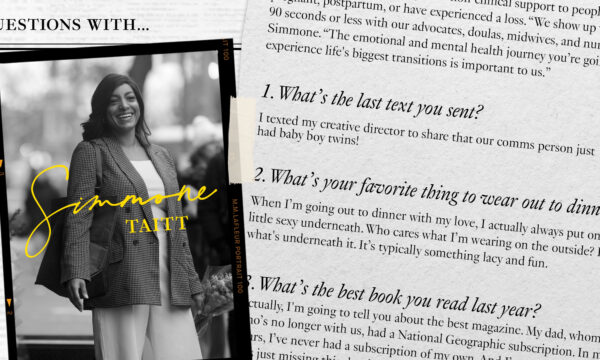
Shop This Look
All Your Work Etiquette Questions, Answered
Our friends and colleagues share advice on navigating 10 work-related conundrums.
These are the dilemmas we deal with as working professionals in 2023. In recent years, factors like new technology, social movements, and a global pandemic have accelerated the evolution of workplace culture faster than we can keep up with. To be sure, we thank our lucky stars that many workplaces are more open, compassionate, and flexible than ever before. And while we may have a complicated relationship with our inboxes, we’re grateful for the digital tools at our fingertips. But as work-life boundaries fade and the prevalence of remote communication skyrockets, it feels like confusion around office decorum is at an all-time high.
Only one thing is certain: Nobody is a definitive expert in avoiding workplace faux pas. So to get a well-rounded perspective on professional protocol, I turned to crowdsourcing. Here’s what our friends and colleagues had to say about 10 of our burning work-etiquette questions.
Want more M Dash?
Sign up for our weekly newsletter.
Thank you!
1. If a work emergency comes up over the weekend, is it okay to text or call a colleague?
“For better or worse, most employees have email (and sometimes Slack) notifications on their phones, so I would always try going through those channels first. If you can’t reach them through work channels, and it’s a true emergency, I think it’s okay to text or call—but before you do, ask yourself, ‘Can this really not wait until Monday?’” —Maddie, Senior Brand Manager
“I think you can first try to email or Slack a colleague. If you haven’t heard back within an hour or so, I would reach out over text to try to resolve the issue as soon as possible.” —Kathleen, Senior Marketing Associate
“Yes, in my field, professional services, it’s expected. Of course, it’s always best to ask your colleague what time is best to chat in order to respect any plans they’ve made. I also think it’s best practice to pause before reaching out and be thoughtful about whether the issue is truly an emergency, i.e. whether it needs to be addressed immediately or can wait until Monday AM.” —Dina, Senior Client Partner
“Yes, I think it’s okay. If you’re close to the colleague, it’s no big deal. If you explain the situation is urgent, people tend to be understanding in my experience.” —Alana, Nurse Practitioner
“Yes, especially if you work in a real-time industry and experience something with widespread impact, e.g. your retail website crashing.” —Maureen, Senior Director of Growth
“I’d do my best to put myself in their shoes and think about whether the situation is worthy of weekend communication or not. If you would want to be contacted, then I’d reach out. At the end of the day, if it’s an emergency, I don’t think your colleague will be upset that you reached out, and if they are, you can set up a plan for next time to try to mitigate emergencies and decide when texting or calling is needed.” —Anna, Senior E-Commerce Associate
2. When should I send an email versus an instant message (e.g. Slack)?
“In general, I think email is best for longer messages with lots of information/follow-ups, as well as requests that aren’t urgent. Slack is good for quick updates and questions for which you need an immediate response. That said, it’s also helpful to understand your company’s culture around communication and to be mindful of how your specific colleagues like to receive information.” —Maddie
“When you start to work closely with a colleague, you should ask their preferred method of communication. You can be mindful of their preference and also inform them which you prefer when it comes to different types of updates.” —Kathleen
“Anything that can’t be explained in less than a paragraph should be sent by email. I feel bad if my Slack message takes up their whole screen!” —Alana
“If the recipient can answer you in two sentences or fewer, then Slack will be most efficient. If it’s a more substantial ask, then email is the best route.” —Maureen
“My rule of thumb is if I’m asking something of someone, I’ll email them (or add it to our project management tool, Asana) so it doesn’t get lost in instant messages. I’ll also send an email when it involves multiple teams or individuals, so we can stay as organized as possible. If I need a prompt answer, I’ll Slack.” —Anna
3. When is it appropriate to give a gift to a colleague?

“If you’re a manager, you can gift your direct reports around the holidays or their birthdays—just make sure to avoid playing favorites and don’t get different people on your team gifts of differing values. I also think it’s completely fine to get gifts to show appreciation for your work friends. However, nobody should ever feel obligated to get gifts for their coworkers.” -Maddie
“I think it is appropriate to gift a colleague if you work closely with them. But if you’re not comfortable purchasing a gift, you can always write a card to show some form of appreciation.” —Kathleen
“I don’t see a problem giving small tokens of appreciation to colleagues.”
—Dina
“If you’ve established a friendship at work, I think it’s appropriate to give a gift, but it’s important to not let anyone feel left out. If you give a gift to one colleague and not another, do so in private. It’s also best practice to not ‘gift up’ to your manager/superior in order to avoid them thinking you’re playing teacher’s pet.” —Alana
“If they are a close friend at the office.” —Maureen
“Birthdays always feel like an appropriate gifting opportunity to me. Treating someone to something small like a coffee is also a thoughtful gesture periodically, especially when you know your teammate is going through something. My colleague Venmo-ed me for flowers after a breakup and it made me tear up! But when in doubt, get a feel for what other teammates are doing, and follow suit. Gift-giving is one of my love languages, so I’m biased here!” —Anna
4. What’s the best way to say “no’’ to my boss if I’m running low on bandwidth?
“You can say something like, ‘I’m currently prioritizing X, Y, and Z, so I’ll be able to start working on this project around [date]. If you’d prefer to have it completed sooner, I’m happy to reprioritize. Would you be open to moving out the due date on X?’ Basically, explain why you lack the bandwidth and offer a possible solution.” —Maddie
“I think you should try to accommodate all requests when possible, but it’s important not to take on too much. If you’re overwhelmed for a prolonged period, your work could be negatively impacted. It’s important to be honest with your manager and learn how to delegate work to other team members in order to avoid burnout.” —Kathleen
“When your boss asks you to take on more and you are at your limit, a good practice is to convey a willingness to take on the project/task while letting them know that you are running low on bandwidth. Ask what priority level the new project is, and if it is high-priority, negotiate putting another project on hold while you deal with the new one.” —Dina
“Honesty is the best policy. Let them know you’re feeling overwhelmed, and give them examples of what you’re currently working on, as well as the time it’s taking you to work on each task. This will help them fully understand your situation. If they’re a supportive boss, they should be understanding and help you prioritize among tasks.” —Alana
“I’d say something like, ‘I can add that to my list, but with my current workload, it will most likely take me X days/weeks before I can get to it.’” —Maureen
“I’ll often ask my boss if I should prioritize her newest ask over other things I have on my to-do list. If the new request comes first, then I’ll let her know other things are going to fall behind and ask if that’s okay.”
—Anna
5. How much PTO should I take off if my policy is unlimited?
“I think the exact number of days will be different for every company, but in general, taking PTO is appropriate as long as you’re able to complete your work before going on vacation to ensure your team doesn’t have to pick up the slack. Sometimes this means working ahead and being a little bit busier before you head out, but it’s worth it. Basically, taking PTO is your right, and you should feel empowered to maximize your time off and return refreshed—just make sure you’re not doing so in a way that causes burnout for your teammates.” —Maddie
“If your policy is unlimited, you should feel free to take as much time as needed as long as you’re able to complete your expected tasks. If you feel like you’re potentially taking too much vacation, you should check in with your manager and HR team.” —Kathleen
“Use your discretion and consider the norms of the culture.” —Dina
“I have unlimited PTO and am still trying to figure out the answer. I would say if you’re just starting off at the company, two weeks out of the year is a good starting point. As you grow with the company, I think it’s okay to start taking off more as long as you’re routinely getting your work done.”
—Alana
“Three weeks feels like a reasonable amount, maybe four if it’s an exceptionally busy year for you (weddings, reunions, etc.).” —Maureen
“I’d look to see what other coworkers are doing or ask your HR manager what the norm is for the company.” —Anna
6. I don’t always come prepared with an agenda to my 1:1 with my manager. Is that bad?

“If your manager has specifically asked you to prepare agendas for your 1:1s, then…yes. If not, it’s okay to come without a formal agenda, but you should always have at least a couple of discussion points prepared, even if it’s just about updating your manager on what you’re working on or asking for feedback. If you truly have nothing to discuss, tell your manager that in advance of your 1:1—everyone loves a canceled meeting.” —Maddie
“I don’t think a 1:1 should be structured and formal. There will be times when you need to run through a set list of updates, but I prefer to have a constant flow of communication so you’re both on the same page outside of the scheduled check-ins. If you do have a more informal 1:1, it gives you and your direct report or manager the space to talk about whatever comes up naturally.” —Kathleen
“I wouldn’t call it ‘bad,’ but I do think it’s a missed opportunity to ensure you and your manager are getting the most out of the meeting time, which can be infrequent. The bottom line: Make sure you and your manager are aligned with regards to where projects stand, what you need from them to keep the progress going, how you’re working on your professional development, and other important issues.” —Dina
“I don’t think it’s bad, because oftentimes, the content of the meeting comes naturally. If you’re forgetful and there’s something important to bring up, I do recommend writing it down. Otherwise, I think it’s fine to have it all up here *points to head.*” —Alana
“You may not need a formal agenda, but it’s good to have an informal list of discussion points you’ve gathered throughout the week. A shared Google doc is great, as you can both add to it.” —Maureen
“I don’t think it’s bad, but I personally write down any open questions I have for my manager throughout the week so I remember to go over them. If you’re nervous about what your manager thinks, over-communicating is best. I’d ask my manager what they think: Are we getting the most out of our 1:1s? Do we need a more formal process?” —Anna
7. Is it weird to block off time for lunch on my calendar, or should I just put “busy’’?
“I don’t think it’s weird—enjoy your lunch!” —Maddie
“I prefer putting ‘busy’ on my calendar in place of lunch or other personal events. I’ve seen coworkers put many personal events on their calendars, including daily reminders for their personal schedule, but I don’t think it’s necessary on a shared work calendar. If you need a break in the day or if you need to sign off early for personal reasons, all you need to do is mark that you will be unavailable at that time.” —Kathleen
“Not weird at all. I block time off weeks in advance for lunch and even for planning or thinking time. It’s becoming a norm to attend to our well-being, and blocking time for self-care, including lunch, is a part of that.”
—Dina
“If you’re having trouble getting a break to eat, I think it’s perfectly reasonable to block off that time specifically for lunch. You need fuel to be productive!” —Alana
“Not weird at all. It lets colleagues know you are offline and taking a much-needed break.” —Maureen
“No! I love to see people doing this.” —Anna
8. What should I say to someone who just got laid off?
“This can be so tough, but at the end of the day, I think you can be pretty straightforward: Express your sympathies, tell them you enjoyed working together, and be on the lookout for positions you hear about that you may be able to refer them to. Remember that they may feel overwhelmed, so avoid sending overly long messages that give them the burden of a long reply.” —Maddie
“Depending on your personal relationship with the coworker, you can determine if you should reach out over email or text. Even if you’re not close with the coworker, I think you should still reach out to some extent in order to wish them the best. You want to make sure they know their time and work were appreciated.” —Kathleen
“I would say something like, ‘I’m sorry this happened. Please let me know if there is anything I can do or if there is anyone I can connect you with as you sort things through. And please keep in touch.’” —Dina
“I think it depends on how well you know the person. If you do reach out, let them know you’re thinking of them and you’re sorry it happened. A brief note will ensure you don’t overwhelm them but lets them know you care.” —Alana
“Be as supportive as possible and in two parts. The immediate: ‘Want to meet for coffee?’ Don’t rush into talking about their job search before they’re ready. Once they’ve processed and are ready to look for their next role: ‘Can I share your search with my network, connect you with recruiters, and/or write you a letter of recommendation?’” —Maureen
“Gosh, this is hard. Asking them if they’re okay and being a sounding board is a nice way to show support, but this situation is something I’d judge on a case-by-case basis. Sometimes it’s good to give the person some space, and when the time feels right, let them know that you’re there to help and will be watching out for open roles. ” —Anna
9. Can I ask a current colleague to write a letter of recommendation?
“In most cases, I would avoid it, but I think it’s fine to make an exception if you have a close relationship with the person you’re asking.” —Maddie
“Yes, you can ask a colleague for a letter of recommendation. If you are still currently working together and the letter of recommendation is for a job outside of the company, be mindful of who you are asking to ensure you don’t put yourself or your colleague in a tough situation. If you’re unsure, ask a former colleague instead.” —Kathleen
“Yes, and of course, I’d select those you trust to keep your exploration/search confidential.” —Dina
“Yes, I’d say you can! I’ve asked current colleagues, but only ones I trusted and who fully understood my reasons for leaving.” —Alana
“Yes. Your current colleagues have the freshest perspective and can comment on your most recent growth and strengths. But only ask a colleague who can keep your job search private!” —Maureen
“This is tough. I think you can, but it’s a little awkward. I would only do this if I were extremely close to my colleague; otherwise, I’d feel weird about them knowing I’m applying elsewhere.” —Anna
10. Is it okay to follow coworkers on social media?
“It’s fine to request your coworkers on social media, but don’t be offended if they don’t accept your request. Some people prefer to keep their personal and work lives separate, and it’s important to respect those boundaries. This probably goes without saying, but if you are going to be social media friends with your coworkers, you’ll want to be mindful of what you post. And if you’re posting something that would be inappropriate for your manager to see, then yes, you should block them.” —Maddie
“I think it’s okay to follow coworkers on social media, but I prefer to avoid following my manager. If you manage someone, I’d only follow them if they follow you first.” —Kathleen
“I like to practice separating my work and social life; however, if I become close with a colleague and we see each other outside of work, I’ll let them follow me and will follow them. I think it’s best to block the manager if you have a very formal relationship with them. I’d personally feel more comfortable knowing my superiors can’t see any of my posts, even if I have nothing to hide.” —Alana
“If you have a peer relationship, I think it’s fine. I don’t follow anyone I manage, as I don’t want them to feel ‘watched’ or that they should censor themselves.” —Maureen
“My team is so open, and no one judges what you’re doing in your free time, so I personally enjoy being connected with everyone on Instagram. Depending on your industry and your relationship with your coworkers, I would ask yourself how comfortable you feel. I don’t think it matters what you do in your free time or what you post on social media if you’re getting your work done.” —Anna










